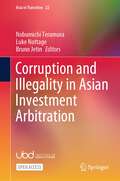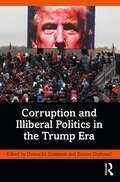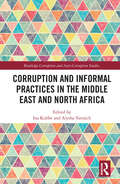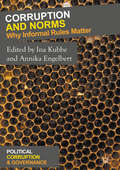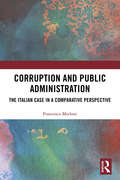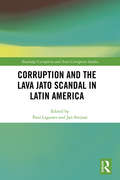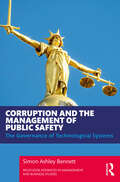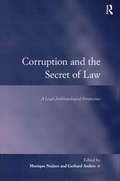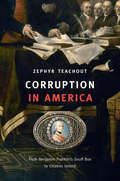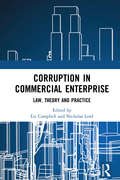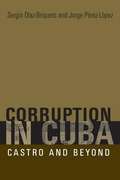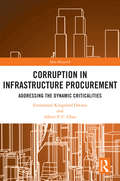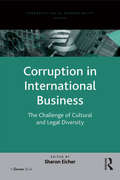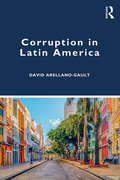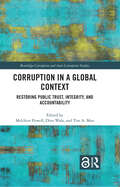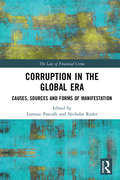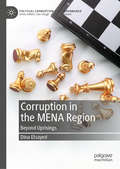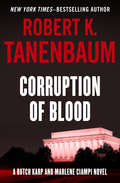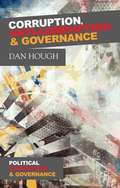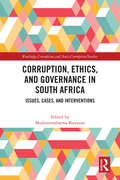- Table View
- List View
Corruption and Government
by Susan Rose-Ackerman Rose-Ackerman, Susan and Palifka, Bonnie J. Bonnie J. PalifkaThis book suggests how high levels of corruption limit investment and growth can lead to ineffective government. Developing countries and those making a transition from socialism are particularly at risk, but corruption is a worldwide phenomenon. Corruption creates economic inefficiencies and inequities, but reforms are possible to reduce the material benefits from payoffs. Corruption is not just an economic problem, however; it is also intertwined with politics. Reform may require changes in both constitutional structures and the underlying relationship of the market and the state. Effective reform cannot occur unless both the international community and domestic political leaders support change. No single 'blueprint' is possible, but the primary goal should be to reduce the gains from paying and receiving bribes, not simply to remove 'bad apples'.
Corruption and Government: Causes, Consequences, and Reform
by Susan Rose-AckermanThis book suggests how high levels of corruption limit investment and growth can lead to ineffective government. Developing countries and those making a transition from socialism are particularly at risk, but corruption is a worldwide phenomenon. Corruption creates economic inefficiencies and inequities, but reforms are possible to reduce the material benefits from payoffs. Corruption is not just an economic problem, however; it is also intertwined with politics. Reform may require changes in both constitutional structures and the underlying relationship of the market and the state. Effective reform cannot occur unless both the international community and domestic political leaders support change. No single 'blueprint' is possible, but the primary goal should be to reduce the gains from paying and receiving bribes, not simply to remove 'bad apples'.
Corruption and Illegality in Asian Investment Arbitration (Asia in Transition #22)
by Luke Nottage Bruno Jetin Nobumichi TeramuraThis open access book explores Asian approaches towards investment arbitration—a transnational procedure to resolve disputes between a foreign investor and a host state—setting it in the wider political economy and within domestic law contexts. It considers the extent to which significant states in Asia are, or could become, “rule makers” rather than “rule takers” regarding corruption and serious illegality in investor-state arbitration. Corruption and illegality in international investment are widely condemned in any society, but there remains a lack of consensus on the consequences, especially in investment arbitration. A core issue addressed is whether a foreign investor violating a host state’s law should be awarded protection of its investment, as per its contract with the host state and/or the applicable investment or trade agreement between the home state and the host state. Some suggest such protection would be unnecessary as the investor committed a crime in the host state, while others attempt to establish an equilibrium between the investor and the host state. Others claim to protect investment, invoking the sanctity of promises made. The book starts with a deep dive into economic and legal issues in corruption and investment arbitration and then explores the situation and issues in major countries in the region in detail. It is a useful reference point for lawyers, economists, investors, and government officials who are seeking comprehensive and up-to-date information on anti-bribery rules in Asian investment treaties. It is of particular interest to students and researchers in economics, finance, and law, who are undertaking new research relating to the multifaceted impacts of corruption.
Corruption and Illiberal Politics in the Trump Era
by Donna M. Goldstein Kristen DrybreadThis book explores the nexus of corruption, late capitalism, and illiberal politics in the Trump era. Through deep, contextualized analysis and careful critique, it offers valuable perspectives on how corruption is defined and understood in the current historical moment. The book asks: Is today's corruption something new, or is it a continuation of prior patterns of illiberalism? Chapters in this collection consider how corruption is practiced, mobilized, or invoked in a range of cases, each of which is embedded within larger concerns about what citizenship, social belonging, honesty, and justice mean in the United States today. The authors examine a constellation of unscrupulous actors and questionable actions, with topics ranging from sex scandals and shady real estate deals to the Trump administration’s response to the COVID-19 pandemic. Several essays directly address the increasingly violent rhetoric and the deliberately anti-democratic policies that have flourished during the Trump era. The book draws on anthropological insights and comparative analysis to place the policies and practices of Trump and his supporters in a wider global context. Corruption and Illiberal Politics in the Trump Era will be of great interest to readers from anthropology, sociology, political science, discourse studies, media studies, linguistics, and American studies.
Corruption and Informal Practices in the Middle East and North Africa (Routledge Corruption and Anti-Corruption Studies)
by Ina Kubbe Aiysha VarraichThis book investigates the pervasive problem of corruption across the Middle East and North Africa. Drawing on the specifics of the local context, the book explores how corruption in the region is actuated through informal practices that coexist and work in parallel to formal institutions. When informal practices become vehicles for corruption, they can have negative ripple effects across many aspects of society, but on the other hand, informal practices could also have the potential to be leveraged to reinforce formal institutions to help fight corruption. Drawing on a range of cases including Morocco, Lebanon, Turkey, Jordan, Tunisia or Israel the book first explores the mechanisms and dynamics of corruption and informal practices in the region, before looking at the successes and failures of anti-corruption initiatives. The final section focuses on gender perspectives on corruption, which are often overlooked in corruption literature, and the role of women in the Middle East. With insights drawn from a range of disciplines, this book will be of interest to researchers and students across political science, philosophy, socio-legal studies, public administration, and Middle Eastern studies, as well as to policy makers and practitioners working in the region.
Corruption and Norms: Why Informal Rules Matter (Political Corruption and Governance)
by Ina Kubbe Annika EngelbertThis book focuses on the role of norms in the description, explanation, prediction and combat of corruption. It conceives corruption as a ubiquitous problem, constructed by specific traditions, values, norms and institutions. The chapters concentrate on the relationship between corruption and social as well as legal norms, providing comparative perspectives from different academic disciplines, theoretical and methodological backgrounds, and various country-studies. Due to the nature of social norms that are embedded in personal, local, and organizational contexts, the contributions in the volume focus in particular on the individual and institutional level of analysis (micro and meso-mechanisms). The book will be of interest to students and scholars across the fields of political science, public administration, socio-legal studies and psychology.
Corruption and Public Administration: The Italian Case in a Comparative Perspective
by Francesco MerloniCorruption and Public Administration looks at public sector organizations and what they have achieved since signing the UN Convention Against Corruption (UNCAC) Agreement in Merida in 2004. It examines how the signee countries engaged in the set-up of institutions to contain corruption in public administration, and how these governments and institutions have progressed. The book compares several developed countries, and undertakes an especially detailed examination of Italy. It highlights strengths and weaknesses, and proposes organizational means of addressing the issues, which include diversity in organizational structures and systems, and a focus on prevention rather than repression. The book shines a light on anti-corruption practices and aims to foster open discussion about this pressing topical issue among peers in all relevant fields of the social sciences.
Corruption and Reform in India: Public Services in the Digital Age
by Jennifer BussellThis book asks why some governments improve public services more effectively than others. Through the investigation of a new era of administrative reform, in which digital technologies may be used to facilitate citizens' access to the state, Jennifer Bussell's analysis provides unanticipated insights into this fundamental question. In contrast to factors such as economic development or electoral competition, this study highlights the importance of access to rents, which can dramatically shape the opportunities and threats of reform to political elites. Drawing on a sub-national analysis of twenty Indian states, a field experiment, statistical modeling, case studies, interviews of citizens, bureaucrats and politicians, and comparative data from South Africa and Brazil, Bussell shows that the extent to which politicians rely on income from petty and grand corruption is closely linked to variation in the timing, management and comprehensiveness of reforms.
Corruption and the Lava Jato Scandal in Latin America (Routledge Corruption and Anti-Corruption Studies)
by Jan Svejnar Paul F. LagunesCorruption and the Lava Jato Scandal in Latin America brings together key international and interdisciplinary perspectives to shine new light on Lava Jato, or Operation Car Wash, Latin America’s largest corruption scandal to date. Since 2014, this scandal has unfolded in surprising ways to expose collusion between construction companies and state officials in Brazil and 11 other countries. The corruption uncovered amounts in the order of hundreds of millions of dollars in bribes and billions of dollars in stolen state funds. The volume features evidence that the main construction company at the center of the scandal was—apparently—deliberate about seeking business in corrupt markets. It also evaluates the ambiguous role played by the media, whose members often relied uncritically on classified information released by the authorities. The volume further contributes to our understanding with studies on a number of other relevant topics, including: the overlap between corruption and the planning of the Rio Olympics; Mexico and Peru’s contrasting responses to Lava Jato; the policy reforms needed to avoid a similar scandal in the future; and the roadmap for how Lava Jato should end. Across 15 chapters by leading and emerging scholars and practitioners, this book engages with these issues from a balanced and unbiased perspective, including interviews with key stakeholders on both sides of the case. As one of the first book-length studies to deal with Lava Jato in the English language, this ground-breaking volume is a compelling reading for advanced students and researchers in areas including Corruption Studies, Public Ethics, Political Science, and Latin American Studies, as well as for practitioners working to make governments more accountable.
Corruption and the Management of Public Safety: The Governance of Technological Systems (ISSN)
by Simon Ashley BennettGraft is a common and persistent social pathogen that afflicts the developed and developing world in equal measure. This book describes, through the medium of international case studies, how graft undermines public safety and how, following a near-miss, incident or accident, investigators can use actor-network theory (ANT) to ascertain to what degree and through what mechanisms graft contributed to the event.The book introduces the reader to graft through a variety of case studies and explains how graft works against the public interest. The relatable case studies include the 1989 Hillsborough football stadium disaster, 2007 Adam Air crash, 2015-ongoing Volkswagen diesel emissions scandal and 2020 Beirut ammonium nitrate explosion (Lebanon). It demonstrates the threat graft poses to public safety, economic success and corporate and national reputation. By the end of the book the reader will understand the nature and extent of the problem of graft, how graft undermines safety, confidence and reputation, and how ANT can be used to identify and quantify graft in respect of the governance of technological systems and to ascertain to what degree and through what mechanisms graft contributed to a near-miss, incident or accident.Primarily aimed at an academic audience, this book will offer essential insights to students, researchers and faculty within the fields of risk, crisis and disaster management, as well as corporate governance and safety. The accessible nature of the book will also appeal to safety practitioners, risk managers and accident investigators.
Corruption and the Secret of Law: A Legal Anthropological Perspective (Law, Justice and Power)
by Gerhard AndersThis volume presents an anthropological perspective on the hidden continuities between corruption and law. The authors argue that the two opposites, corruption and law, are inextricably linked - with the possibility of the former already inscribed into the latter. Taking a critical stance towards the normative good governance agenda spearheaded by institutions such as Transparency International and the World Bank, this volume argues that by uncritically depicting corruption as an absolute evil, these anti-corruption programs disregard the close relationship that exists between corruption and state power. Addressing various aspects of a complex and ambivalent phenomenon, Corruption and the Secret of Law draws on studies from different parts of the world including Burundi, China, Indonesia, Italy, Japan, Mexico and the USA and provides a valuable resource for students, researchers and policy-makers working in this area.
Corruption in America: From Benjamin Franklin's Snuff Box to Citizens United
by Zephyr TeachoutWhen Louis XVI presented Benjamin Franklin with a snuff box encrusted with diamonds and inset with the King's portrait, the gift troubled Americans: it threatened to "corrupt" Franklin by clouding his judgment or altering his attitude toward the French in subtle psychological ways. This broad understanding of political corruption-rooted in ideals of civic virtue-was a driving force at the Constitutional Convention. For two centuries the framers' ideas about corruption flourished in the courts, even in the absence of clear rules governing voters, civil officers, and elected officials. Should a law that was passed by a state legislature be overturned because half of its members were bribed? What kinds of lobbying activity were corrupt, and what kinds were legal? When does an implicit promise count as bribery? In the 1970s the U. S. Supreme Court began to narrow the definition of corruption, and the meaning has since changed dramatically. No case makes that clearer than Citizens United. In 2010, one of the most consequential Court decisions in American political history gave wealthy corporations the right to spend unlimited money to influence elections. Justice Anthony Kennedy's majority opinion treated corruption as nothing more than explicit bribery, a narrow conception later echoed by Chief Justice Roberts in deciding McCutcheon v. FEC in 2014. With unlimited spending transforming American politics for the worse, warns Zephyr Teachout, Citizens United and McCutcheon were not just bad law but bad history. If the American experiment in self-government is to have a future, then we must revive the traditional meaning of corruption and embrace an old ideal.
Corruption in Commercial Enterprise: Law, Theory and Practice
by Nicholas Lord Liz CampbellThis edited collection analyses, from multiple disciplinary perspectives, the issue of corruption in commercial enterprise across different sectors and jurisdictions. Corruption is commonly recognised as a major ‘social bad’, and is seriously harmful to society, in terms of the functioning and legitimacy of political-economic systems, and the day-to-day lives of individuals. There is nothing novel about bribes in brown envelopes and dubious backroom deals, ostensibly to grease the wheels of business. Corrupt practices like these go to the very heart of illicit transacting in both legal markets – such as kickbacks to facilitate contracts in international commerce – and illegal markets – such as payoffs to public officials to turn a blind eye to cross-border smuggling. Aside from the apparent pervasiveness and longevity of corruption in commercial enterprise, there is now renewed policy and operational attention on the phenomenon, prompting and meriting deeper analysis. Corruption in commercial enterprise, encompassing behaviours often associated with corporate and white-collar crime, and corruption in criminal commercial enterprise, where we see corruption central to organised crime activities, are major public policy issues. This collection gives us insight into their nature, organisation and governance, and how to respond most appropriately and effectively.
Corruption in Cuba: Castro and Beyond
by Sergio Díaz-Briquets Pérez-López JorgeEven though combating corruption cannot be the central aim of post-Castro policy, Sergio Díaz-Briquets and Jorge Pérez-López suggest that, without a strong plan to thwart it, corruption will undermine the new economy, erode support for the new government, and encourage organized crime. In short, unless measures are taken to stem corruption, the new Cuba could be as messy as the old Cuba.
Corruption in Infrastructure Procurement: Addressing the Dynamic Criticalities (Spon Research)
by Albert P.C. Chan Emmanuel Kingsford OwusuThis book presents an extensive study on the extant constructs of corruption in infrastructure-related projects and aims to contribute to the determination and elimination of its incidence and prevalence in infrastructure projects. The book conducts a comprehensive examination of the various determining factors of corruption that negatively affect the procurement process and, in the end, result in cost and time overruns. The authors present an in-depth understanding of how the identified determining factors of corruption can be addressed. Thus, it is intended to broaden the reader's knowledge of the causes, risk indicators, and different forms of corrupt practices in the procurement process of infrastructure works, before explaining how they affect its stages and activities A dynamic model is developed to demonstrate how to tackle the overall impact of corruption within the procurement process and, at the same time, increase the effectiveness of the extant anti-corruption measures. In short, this book demonstrates that the fight against corruption in the procurement process is strategically feasible and must continue. This book is essential reading for academics, researchers, professionals and stakeholders in the procurement of infrastructure projects and civil works, as well as those with an interest in corruption, construction management and construction project management.
Corruption in International Business: The Challenge of Cultural and Legal Diversity (Corporate Social Responsibility)
by Sharon EicherIt is common practice to assume that business practices are universally similar. Business and social attitudes to corruption, however, vary according to the wide variety of cultural norms across the countries of the world. International business involves complex, ethically challenging, and sometimes threatening, dilemmas that can involve political and personal agendas. Corruption in International Business presents a broad range of perspectives on how corruption can be defined; the responsibilities of those working for publicly traded companies to their shareholders; and the positive influences that corporations can have upon combating international corruption. The authors differentiate between public and private sector corruption and explore the implications of both, as well as methods for qualifying and quantifying corruption and the challenges facing policy makers, legal systems, corporations, and NGOs, as they seek to mitigate the effects of corruption and enable cultural and social change.
Corruption in Latin America
by David Arellano-GaultIn Corruption in Latin America the reader is presented with an alternative starting point for understanding corruption in this key region. The author asserts that corruption is a stable and rational social and organizational mechanism. Seen through this lens, we can begin to understand why it persists, and how to implement strategies to control corruption effectively. Beginning with an in-depth, nuanced examination of the concept of corruption, the author establishes the theoretical basis for viewing corruption as a social construct. An analysis of the experiences of four countries in the region – Argentina, Brazil, Guatemala and Mexico – provides the reader with concrete data from which they can understand how and why these behaviors are reproduced, validated, and tolerated in everyday settings between governments and citizens, governments and firms, and firms and clients. Once we see corruption as the socially sanctioned norm for getting business done, we can begin to produce and propose effective solutions to reduce corruption in Latin America by designing and implementing instruments that transform this dynamic. This rigorous and original approach will challenge the reader’s assumptions about corruption, and will appeal to students of corporate governance, international business, public management, and business ethics.
Corruption in a Global Context: Restoring Public Trust, Integrity, and Accountability (Routledge Corruption and Anti-Corruption Studies)
by Tim A. Mau Melchior Powell Dina WafaThis book provides an important survey of the causes and current state of corruption across a range of nations and regions. Delving into the diverse ways in which corruption is being combatted, the book explores and describes efforts to inculcate principles of ethical conduct in citizens, private sector actors and public sector personnel and institutions. Corruption is a global condition that effects every type of government, at every level, and has bewitched scholars of governance from ancient times to the present day. The book brings together chapters on a range of state and regional corruption experiences, framing them in terms of efforts to enhance ethical conduct and achieve integrity in government practices and operations. In addition, the book addresses and analyses the theoretical and practical bases of ethics that form the background and historical precepts of efforts to create integrity in government practices, and finally assesses recent international efforts to address corruption on an international scale. This book will be perfect for researchers and upper level students of public administration, comparative government, international development, criminal justice, and corruption.
Corruption in the Global Era: Causes, Sources and Forms of Manifestation (The Law of Financial Crime)
by Nicholas Ryder Lorenzo PasculliCorruption is a globalising phenomenon. Not only is it rapidly expanding globally but, more significantly, its causes, its means and forms of perpetration and its effects are more and more rooted in the many developments of globalisation. The Panama Papers, the FIFA scandals and the Petrobras case in Brazil are just a few examples of the rapid and alarming globalisation of corrupt practices in recent years. The lack of empirical evidence on corrupt schemes and a still imperfect dialogue between different disciplinary areas and between academic and practitioners hinder our knowledge of corruption as a global phenomenon and slow down the adoption of appropriate policy responses. Corruption in the Global Era seeks to establish an interdisciplinary dialogue between theory and practice and between different disciplines and to provide a better understanding of the multifaceted aspects of corruption as a global phenomenon. This book gathers top experts across various fields of both the academic and the professional world – including criminology, economics, finance, journalism, law, legal ethics and philosophy of law – to analyze the causes and the forms of manifestation of corruption in the global context and in various sectors (sports, health care, finance, the press etc.) from the most disparate perspectives. The theoretical frameworks elaborated by academics are here complemented by precious insider accounts on corruption in different areas, such as banking and finance and the press. The expanding links between corrupt practices and other global crimes, such as money laundering, fraud and human trafficking, are also explored. This book is an important resource to researchers, academics and students in the fields of law, criminology, sociology, economics and ethics, as well as professionals, particularly solicitors, barristers, businessmen and public servants.
Corruption in the MENA Region: Beyond Uprisings (Political Corruption and Governance)
by Dina ElsayedThis book explores the causes of corruption in the Middle East and North Africa through a systematic cross-national comparative analysis of fifteen countries in the region. It aims to explain causal relationships between corruption and differences in political and socio-economic dimensions within these different countries over the period 1999-2010. The countries are grouped together into three sub-regions (the Gulf region, North Africa, and Mashreq plus Yemen). The author finds that the main variables that showed robustness in impacting the intensity of corruption are the rule of law, quality of regulations, and trade openness. Poverty rates and income inequality have been clear triggers for petty corruption. Meanwhile, natural resources endowments have shown less of an impact on the levels of corruption, and similarly women's empowerment has not been found to be a strong indicator.
Corruption of Blood: Corruption Of Blood, Falsely Accused, Irresistible Impulse, And Reckless Endangerment (Butch Karp and Marlene Ciampi #7)
by Robert K. TanenbaumA prosecutor goes after the truth about JFK&’s assassination in a New York Times–bestselling author&’s &“most enthralling legal thriller to date&” (Vincent Bugliosi). In a forgotten corner of the Georgetown library, New York prosecutor Butch Karp is about to commit a felony. He cracks the seal on a government file, in which he finds papers, a ledger, a reel of film, and a small jar that holds a chunk of human flesh. Just by looking at this material, he has broken the law. It&’s the evidence he needs to prove the true identity of the man who killed Kennedy, and now that he has it, Karp is the most dangerous man in America. Brought to Washington to assist in the Congressional investigation into Kennedy&’s death, Karp was expected to toe the line. As his personal inquiries lead him into a web that stretches from the capos of the mafia to the halls of the Kremlin, this hard-driving attorney realizes the conspiracy that killed Kennedy is still alive—and out for blood. As deputy chief counsel to the 1976 House Select Committee on Assassinations, Robert K. Tanenbaum has an insider&’s understanding of one of the darkest days in American history. Corruption of Blood is a novel inspired by real events by an author who &“knows his criminal procedure cold&” (Publishers Weekly). This ebook features an illustrated biography of Robert K. Tanenbaum including rare photos from the author&’s personal collection.
Corruption, Anti-Corruption and Governance
by Dan HoughBy exploring the anti-corruption strategies in six countries, this book is the first detailed, cross-national analysis on techniques to address corruption. It highlights the importance of understanding that quality of governance is critical to tackling corruption and that only when this link is truly appreciated can inroads into corruption be made.
Corruption, Asset Recovery, and the Protection of Property in Public International Law
by Radha IvoryIn recovering assets that are or that represent the proceeds, objects, or instrumentalities of grand corruption, do states violate the human rights of politically exposed persons, their relatives, or their associates? Radha Ivory asks whether cooperative efforts to confiscate illicit wealth are compatible with rights to property in public international law. She explores the tensions between the goals of controlling high-level, high-value corruption and ensuring equal enjoyment of civil and political rights. Through the jurisprudence of regional human rights tribunals and the literature on confiscation and international cooperation, Ivory shows how asset recovery is a human rights issue and how principles of legality and proportionality have mediated competing interests in analogous matters. In cases of asset recovery, she predicts that property rights will likewise enable questions of individual entitlement to be considered in the context of collective concerns with good governance, global economic inequality, and the suppression of transnational crime.
Corruption, Contention, and Reform
by Michael JohnstonMichael Johnston argues that corruption will persist, and even be the rule rather than the exception, until those with a stake in ending it can act in ways that cannot be ignored. This is the key principle of 'deep democratization', enabling citizens to defend their interests by political means. The author analyses four syndromes of corruption in light of this principle: official moguls in Egypt and Tunisia, oligarchs and clans in the Philippines, elite cartels in Argentina, and influence markets in France, Australia and the US. Johnston argues that different kinds of corruption require distinctive responses, each bearing specific risks. Focusing on recent events, including the global economic crisis and the Arab Spring, he shows that we can assess vulnerabilities to corruption and the effects of reforms, and use this information to identify new practices. His book offers a fundamental reappraisal of ways to check abuses of wealth and power.
Corruption, Ethics, and Governance in South Africa: Issues, Cases, and Interventions (ISSN)
by Modimowabarwa KanyaneThis book assesses landmark empirical studies, state capture concerns, corruption, and fraud in South Africa’s public sector and thereby reflect on issues of accountability and ethics as cornerstones of governance.Bringing together some of the best minds about corruption, ethics, and governance from a multidisciplinary perspective, the book pushes critical thinking to interrogate interventions that could stamp out and stop the rot of corruption in society. The book investigates the behaviours of officials and politicians engaging in acts of corruption and considers how state institutions have been captured and corrupted by these people. Considering South Africa’s historical and regional context, the book also considers the role of watchdogs, auditors, and public opinion. In suggesting mechanisms for combating and preventing corruption, the book ultimately advocates for long-lasting preventive interventions instead of current short-lived and costly approaches to combating corruption.Combining original case studies, empirical work, and some comparisons in Zimbabwe and Botswana with South Africa, this book will be of interest to students, researchers, and policymakers working on corruption, ethics, and governance from the context of public administration and law.

